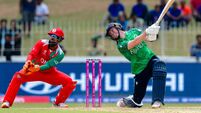Why Keith Earls' inspirational chase could make all the difference for Ireland

On this occasion, the loss to injury of Robbie Henshaw for the rest of the season is not only a big blow to Ireland’s title aspirations but also to Leinster’s European ambitions. Of equal concern is the tweaked hamstring that forced Tadhg Furlong off the field without a single scrum engagement just three minutes into the match.
The medical prognosis on him after the game was more positive which is encouraging given his key role in the side, especially as the Welsh scrum has proved pretty effective in the championship to date. I fear, however, that a dodgy hamstring may require a bit more time than the two weeks Furlong now has available to him.















